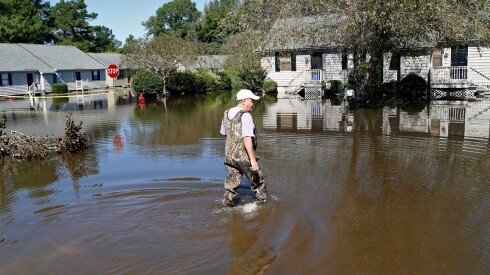Latest News
A state Supreme Court justice won a narrow victory in November. Her challenger argues tens of thousands of votes should be thrown out.
Forty million Americans live in food deserts. Can government-owned grocery stores fix this?
Five years after the murder of George Floyd and just ahead of the Trump administration, Minneapolis agreed to enter into a consent decree with the Department of Justice. DOJ cited five others as models for success.
Hot, strong desert air is contributing to the devastating fires in the Los Angeles area. The current winds are much less predictable than previous patterns.
Stimulants such as cocaine and methamphetamine now often come laced with deadly amounts of fentanyl. The current wave is driving up mortality among Black and Hispanic Americans particularly.
The Yes In My Backyard movement is barely a decade old. But it has set the terms of the debate over state and local housing policy.
The state’s 988 service has a $7 million shortfall and the nation’s fifth highest rate of abandoned calls. The suicide rate in Texas has risen dramatically during this century.
Democrats outperformed Kamala Harris’ showing in three legislative districts but fell short of President Biden’s showing back in 2020.
As Georgia governor, he was a pioneer in efforts to attract foreign investment and promote exports, setting the stage for how U.S. states would help shape the global economy.
There's turnover in Washington with each new administration. Departing federal workers can bring valuable skills and experience to state and local governments.
Recent laws to improve pension financing should save states tens of billions of dollars over the long term.
Human services officials say more treatment options are needed to place children, but lawmakers are concerned lighter regulations will create more problems.
The city’s planning office won’t approve conversion of single-family properties into multiple units in six neighborhoods. The desire to protect Latino neighborhoods from gentrification runs counter to the city’s housing goals.
Governors, mayors and finance officers are treading water, awaiting the outcome and impact of a new Washington regime’s vows to slash federal spending and taxes. Meanwhile, state and municipal budgeters and debt managers will need to make intelligent guesses and pay more attention to their rainy-day funds.
With 13 states offering coverage, it’s already a $3.9 billion cost. Some state officials say reducing obesity will save programs money in the long run.
Arrests connected to the home-built weapons are growing rapidly in the U.S. and around the world. It’s likely to prove harder for governments and police to keep them out of the hands of criminals and extremists.
The personnel cost has doubled over the last three years. Employees have been granted more sick leave but they seem to be using more due to in-person work requirements.
After years of cuts, the agency’s budget has doubled since 2020. But its new director will face challenges due to policy differences with the incoming Trump administration.
Iowa leads the nation in the percentage of its electricity it generates from wind and solar, showing that the transition doesn’t have to be expensive or scary or even constrained by politics.
State officials face challenges from shrinking revenue and major changes from Washington in shared programs such as education and Medicaid.
With the state facing its worst budget gap in two decades, everything from education and juvenile justice to transportation spending is on the line.
Black drivers, in particular, are stopped at disproportionate rates, a study of 5 million traffic stops found. Police officers say the analysis was flawed.
New York City’s Department of Transportation awarded a third of its contracts to minority- and women-owned businesses last year, a priority of Commissioner Ydanis Rodriguez.
Thomasville Regional Medical Center opened its doors at the start of the pandemic. It didn’t survive, but unlike most shuttered rural hospitals, it’s practically brand new.
Both suspects appear to have military backgrounds and both used the same app to rent vehicles.
Farmers must destroy their flocks when bird flu is detected. With payments already exceeding $1 billion, the government will now require biosecurity audits.
They face more challenges than urban schools. But there are strategies they can use to prepare and cope.
Every few decades, we have an opportunity to change what our cities can be. This is one of those moments.
They’ve generated over $100 billion in investments in thousands of struggling communities. We have the opportunity to extend and expand the program — and to make it permanent.
Some communities are investing in new infrastructure and designs not only to protect residents but improve quality of life.
Sponsored
Most Read













































